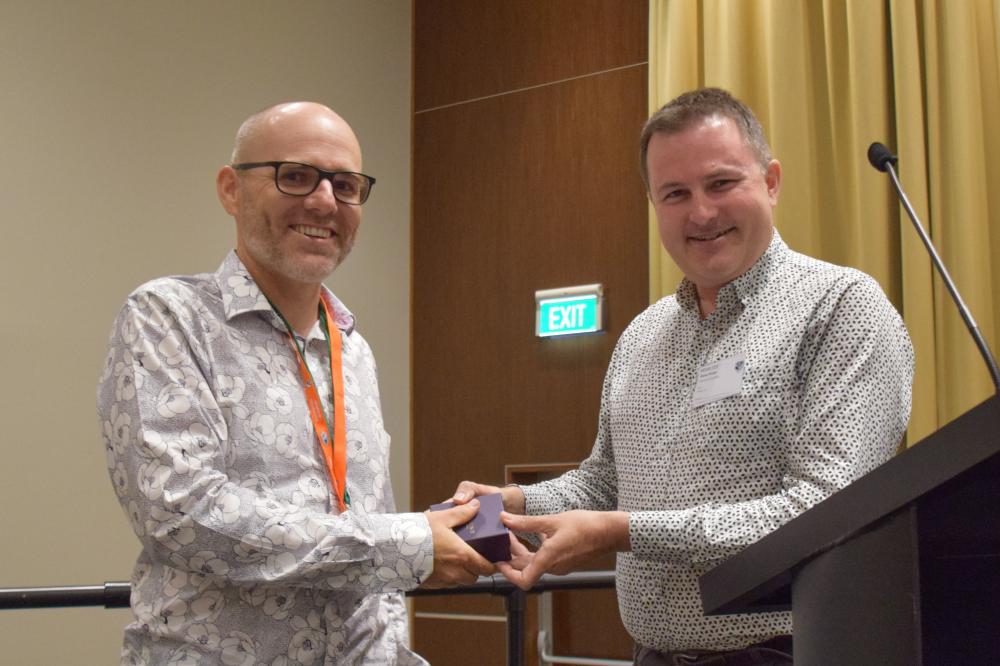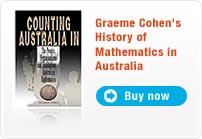The 2019 EO Tuck Medal
Professor Scott McCue, from Queensland University of Technology, is an outstanding applied mathematician with expertise across a broad range of research areas, and is an inspirational and committed leader in the ANZIAM community.

In particular, Scott’s research has a focus on developing and applying theoretical and computational techniques to problems in interfacial dynamics and mathematical biology, but he has also made broader contributions to industrial mathematics. Scott has led numerous funded research projects, and has received over $2.8 million funding for ARC Discovery and Linkage Projects, including $740K from his industry partners.
Scott's primary expertise is in the area of interfacial dynamics, which concerns developing and analysing mathematical models for complex processes that involve moving interfaces. Scott has applied conformal mapping, integral transforms and boundary integral methods to study surface gravity wave problems, specialising in both linear and nonlinear settings. He has published numerous papers in this area, including five in the prestigious Journal of Fluid Mechanics. In recent years, Scott's research group at QUT has also. developed new extremely efficient computational methods and applied these techniques to study unusual features of highly nonlinear ship wave patterns.
Scott's research in interfacial dynamics also covers nonlinear moving boundary problems in Hele-Shaw and Darcy flow, focussing on selection problems, viscous fingering, pattern formation, self-similarity and singularity structure. A closely related subject of Scott's research is in the area of Stefan problems, for which Scott is well known for his asymptotic analysis of `hole-closing' problems.
Scott's second research area is mathematical biology, in particular developing and analysing reaction diffusion models and random walk processes for collective cell motion, with applications to wound healing and cancer biology. The impact of this work is both in applied mathematics itself and for end users in biology. The highlights of Scott's work in this area include new insights into nonlinear degenerate diffusion for cell migration and mechanochemical models for tissue growth.
The third area of Scott's research is industrial mathematics, which involves applying a suite of mathematical modelling techniques to solve practical problems of direct relevance to industry partners. Scott leads a large project, funded by two ARC Linkage grants, which is constructing a suite of mathematical models to investigate spray droplet interactions at the single leaf, whole plant and crop level. The mathematical components of this project have led Scott and his group to new discoveries in the fields of thin film flows over curved surfaces and droplet impaction on hydrophobic surfaces.
Scott has made an exceptional contribution to the teaching and supervision of students and emerging researchers. He has supervised 7 post-doctoral fellows and 14 PhD students to completion, as well as supervising an additional 46 undergraduate, summer, Honours or Masters projects. In terms of opportunity, Scott has held a traditional academic position since 2005 with a full teaching load. In recent years, he has taken on significant leadership roles at QUT including being the Discipline Leader for Applied and Computational Mathematics, ERA Director for the Science and Engineering Faculty and HDR Director for the School of Mathematical Sciences.
Scott has been an important leader in the ANZIAM community. He served two 2-year terms (2006-7 and 2010-11) on the ANZIAM Executive. He has attended 20 ANZIAM conferences and has served as a member of the TM Cherry Prize Committee on four occasions. He was Secretary of the ANZIAM Conference in Caloundra in 2009, and in 2015 was co-Director for the annual ANZIAM Conference in Surface Paradise. As a Director, Scott led the organisation of this successful conference and developed the well-received scientific program. Scott demonstrated leadership in the ANZIAM community by playing a major role in the invited speakers committee, acting as MC for the conference dinner and awards ceremony, and facilitating the Women in Mathematics Lunch.
Scott is the Chair of the Michell Medal Committee in 2018, after serving as Incoming Chair in 2017. Scott is an ongoing Trustee in the AF Pillow Applied Mathematics Trust, a role that involves reviewing Trust. activities and ranking the applications for the AF Pillow Applied Mathematics PhD top-up Scholarship. Since February 2008 Scott has been on the Editorial Board of the ANZIAM Journal, handling 85 articles in both the printed journal and the electronic supplement.
Scott was Chair of QANZIAM for the four years 2006-09. In this role, Scott represented QANZIAM in the ANZIAM community, formulating and reporting on QANZIAM activities, and successfully advocating for a significant increase in annual funding. Scott has organised four annual QANZIAM conferences. Under Scott's leadership, the QANZIAM Executive put in place strategies to further engage with students, for example by waiving student registration fees and by funding a student prize for the most outstanding student presentation.
The selection panel unanimously recommends that Professor Scott McCue be awarded the ANZIAM E.O. Tuck Medal for 2019.
On behalf of ANZIAM: Troy Farrell (QUT) Shaun Hendy (University of Auckland) Yvonne Stokes (University of Adelaide) Peter Taylor (University of Melbourne)


